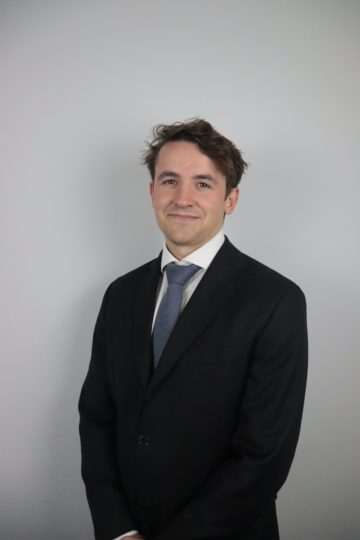
The Bar congratulates Alexander Langan MacDonnell BL on his selection as the 2024 of the Bar of Ireland and Irish Council for Civil Liberties (ICCL) Procedural Rights Fellow.
Alexander highlights his journey to the barrister profession, his work in the CCJ and his motivations to apply for the ICCL Fellowship.
Why did you choose a career as a barrister?
I chose a career as a barrister after I took part in TY work experience in the courts and saw the type of work that goes on in the courts and the numerous opportunities that are open to someone in this career. This can be said for both the type of law and the roles that barristers play, not only in practice but also in industry. Going to the courts and seeing the how the process is carried out is invaluable to anyone who is thinking of pursuing this kind of career.
Once I saw that the fellowship was open to me, I wanted to continue to be a part of that kind of work at home. This will allow me to incorporate advocacy and reform into my own practice.
How have you found working in the CCJ and the Courts? What elements are most rewarding and challenging?
Working in the CCJ has been an adjustment and is not like other workplaces, the nature of the work and the gravity of each case makes it a unique environment. However, in my experience there is a very high level of support and encouragement from colleagues that makes adapting much easier.
Although each barrister is a sole trader, there is advice available from everyone and collegiality is taken seriously.
What attracted you to the ICCL Fellowship? What do you hope to gain from the experience?
I have been a part of organisations where human rights have been at the forefront of their work. In the United States I did an internship which gave me something to compare my knowledge of the legal system at home to. It was also a unique chance to research the area of wrongful convictions, where it was evident that human rights had been ignored, and safeguards avoided.
Once I saw that the fellowship was open to me, I wanted to continue to be a part of that kind of work at home. This will allow me to incorporate advocacy and reform into my own practice.
What will the Fellowship entail?
The fellowship is a chance to take part in the research and advocacy that the ICCL conduct, it will focus on procedural rights and the relevant issues in that space. One example of a novel issue that will become more relevant is the use of facial recognition technology in both the investigative and criminal process, I’m looking forward to contributing to research in this area through a human rights lens.
What would you say to anyone considering going the barrister/Kings Inns route?
I would say that it is a rewarding career and valuable qualification to have, it provides many opportunities to work in a variety of different fields depending on what area of law you want to engage in. You can tailor your study and practice to your own interests, which is one of the unique aspects to the barrister path.
About the ICCL Fellowship
The Bar of Ireland ICCL Fellowship is a unique opportunity for young barristers looking to gain experience and insight into the policy side of human rights law and advocacy work in Ireland. The Fellowship builds on the long relationship between The Bar of Ireland and ICCL and the mutual interest of both bodies in supporting the rule of law and strengthening the protection of procedural rights in the Irish criminal justice system. The Fellowship also reflects the Bar’s strong support for the administration of justice, civil liberties and the protection of constitutional and human rights.
The professional development of a barrister with an intention practice in the area of criminal law is the primary aim of the Fellowship. Practitioners in Years 1 – 3 will be notified directly, and via InBrief when the application process opens for 2025 candidates. For more information on the ICCL Fellowship, click here.
The views expressed above are the author’s own and do not reflect the views of The Bar of Ireland.
